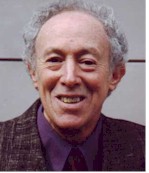
Please Note: The content on this page is not maintained after the colloquium event is completed. As such, some links may no longer be functional.
William Crossman
CompSpeak 2050: How Talking Computers will Recreate an Oral Culture by 2050
Wednesday, November 1, 2000
Building 3 Auditorium - 3:30 PM
(Refreshments at 3:00 PM)
Goddard's Office of the Assistant Director for Information Sciences continues the GSFC Fall 2000 Series of the Information Sciences and Technology (IS&T) Colloquium with Prof. William Crossman, whose presentation will focus on How Talking Computers Will Recreate an Oral Culture by 2050. Prof. Crossman's prediction is that in the 21st Century, VIVOs (voice-in/voice-out computers using visual displays but no text) will make written language obsolete, which will result in there being no compelling reason for schools to teach literacy skills. Written language/text is a technology - an ancient technology for storing and retrieving information. Talking computers will do this same job more quickly, efficiently, cheaply, and universally, and won't require users to know how to read and write. By 2050, the electronically-developed nations will become oral cultures; by 2150, a worldwide oral culture will be in place. Today's push to develop VIVOs is a further step in the human evolutionary drive to move past written language's limits and return to the biogenetic, oral-aural, pre-alphabetic roots of human communication and information storage. VIVOs will transform every area of human activity in the 21st Century, including education, the arts, human relations, politics, and business.
Prof. Crossman(link is external), founder/director of the CompSpeak 2050 Institute for the Study of Talking Computers and Oral Cultures is a philosopher, futurist, professor, speaker, consultant, and author concerned with the issues of education, information technology, language and culture, and human rights. His controversial forthcoming book, CompSpeak 2050: How Talking Computers Will Recreate an Oral Culture by Mid-21st Century (Select New Book Pages for Preview(link is external)), draws on his three decades of experience as a teacher at colleges and universities from coast to coast. The author's thesis - that talking computers will replace written language by 2050 and will transform every area of human activity - has provoked much interest and debate at the many conferences, hi-tech research and development centers, university forums, corporate meetings, and TV and radio programs where he has spoken.
IS&T Colloquium Committee Host: Howard Kea
